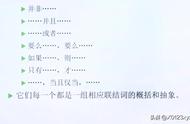(八)不定代词
不定代词,即不指明代替任何特定名词或形容词的代词。
1. 不定代词one的用法
(1)one指不定人称时,相当于anyone,表示任何一个人、人人、其反身代词为oneself,物主代词为one’s。凡是要重复one或one's的地方,可以用he或his来代替。
One has to do one's best.
人人都要尽力而为。
One who does not take of his (不用one's) health is likely to be ill at any time.
不注意自己健康的人随时都可能生病。
(2)代替前面出现过的可数名词,以免出现重复,复数形式ones,可与冠词连用,可以有自己的定语。如:
Please pass me the book, the one on the top shelf.
请把那本书递给我,书架顶上那本。
The new cars are much better than the old ones.
这些新车比旧车好很多。
(3)one of之后的名词或代词一定是复数,one of...作主语时,必须接单数动词;但one of...后面接定语从句时,定语从句的谓语动词用复数。如:
One of my friends is going to meet me at the airport.
我的一个朋友会在机场见我。
Jone is one of the students who are never late.
琼是从不迟到的学生之一。
2. no one,nobody,none的用法
(1)no one和nobody同义,意为“无一人”,相当于not anyone,作主语时用单数动词,可用于回答who问句。如:
No one expects you to be perfect.
没人指望你是完美的。
-Who's in the classroom? -Nobody.
谁在教室里? 没人。
(2)none指三者或三者以上中的“任何一个都不”,可指人也可指物,相当于not one或not any persons/things,可用于回答how many...问句。none作主语时,用单数动词或复数动词都可以;none后面常接of短语。
Any is better than none.
有总比没有好。
None has/have made such an attempt.
没有人做过这样的尝试。
It's none of your business.
不关你事。
3. either,neither,both的用法
(1)这三个词都只能指两个人或两件事物。both“两者都”,either“两者中任何一个”,neither“两者都不”。这三个词也可作形容词用,后接名词。作主语时,either,neither与单数连用,both与复数连用。如:
Neither car is exactly what I want.
这两辆车都不是我想要的。(作定语)
Both look equally good.
这两个看起来都很好。(作定语)
There are flowers on both sides of the street.
路边长满了野花。(作定语,强调两边)
There are flowers on either side of the street.
路边长满了野花。(作定语,强调每一边)
(2)both之后可接名词,也可接the或形容词性物主代词,再接名词;both of之后可接名词或代词,但接名词时,名词前必须有限定词the或形容词性物主代词;而either和neither不能这样用,可用于neither/either of 人称代词或neither/either of the/these/those...。如:
Both the boys are clever.//Both of the boys are clever.//Both boys are clever.
两个男孩都很聪明。
Either/Neither of the two boys is clever.
两个男孩都很/不聪明。(不可去掉of)
Neither of them can swim.
他们俩没有一个会游泳。
4. each,all和形容词every的用法
(1)三者都可用来概括全体,但强调重点不同:all指三者或三者以上的“全部”,整体性地考虑总体(具有概括性);every指三者或三者以上中的“每个”,考虑总体中的所有成员(与all很接近);each指两者或两者以上的“每个”,是逐个逐个地考虑总体(具有个别性)。
All books are interesting.//Every book is interesting.
所有的书都很有趣。
There are trees on each side of the road.
路两边都有树。(指两者,不可用every)
(2)all和each既可作代词(单独使用或后接of短语),也可作形容词(其后接名词);而every却只能用作形容词,不能用作代词。如:
All (of the) books are good.//Each/Every book is good.//Each of the books is good.
所有的书都是好的。//每本书都是好的。
(3)each和every之后通常接单数可数名词,用作主语时,其谓语动词用单数;即使后面接两个用and连接的名词,其谓语依然用单数。但是,each作同位语时,不影响谓语动词的数。如:
Every/Each man and (every/each) woman knows it.
每个男人和女人都知道此事。
The students each have a dictionary.
学生每人有一本字典。(each为主语students的同位语)
Each of the students has a dictionary.
学生每人有一本字典。(each为主语)
(4)every可与almost,nearly,single,without exception等结合,以强调“(几乎)全体一致,没有例外”,但each却不能。如:
Almost every student has read the book.
几乎所有学生都读过这本书。(不可用each)
(5)all和every可与not连用构成not all/every,表示部分否定,意为“并非每个都”;every可用于“every 基数词 复数名词”结构中,等同于“every 序数词 单数名词”,意为“每隔......,每......之中”。但each没有这两种用法。如:
Not every culture divides the sexes absolutely.//Not all cultures divide the sexes absolutely.
不是每一种文化都绝对区分性别。
I go to see my grandmother every three days(=every third day).
我每三天(每隔两天)去看我祖母。
(6)every one与everyone
every one是两个词,既可用来指人,也可用来指物,等于each one,后面可跟介词of;everyone是一个词,只用来指人,等于everybody,后面不能跟介词of,是“每个人,人人,大家”的意思,不指具体哪一个人,作主语时,谓语用第三人称单数形式。如:
Every one of us is getting ready for the exam.
我们每个人都在为考试做准备。
Everyone is here except Tom.
除汤姆外大家都到了。
5. another,other,others,the other,the others的用法
(1)another泛指不定数目之中的“另一个”;the other指确定数目中的“另一个”,多指两个之中剩下的“另一个”,常与one连用,one...the other...。
This office is rather untidy. Can we use another?
这个办公室非常乱,我们能用另一个吗?
I don't like this one. Please show me another.
我不喜欢这一个,请给我看看另一个。
I have two pens. One is black, the other is red.
我有两支钢笔,一支是黑色的,另一只是红色的。
比较:No one can tell one child from the other; they all look quite alike. (至少三个小孩)
(2)another two/three... 复数名词=two/three more 复数名词,意为“再两/三......”。如:
I want to stay for another four(=four more) days.
我想再待4天。
(3)other可作形容词或代词,作形容词时,意思是“别的,其他”,作代词时泛指其他(人或物)。any other通常接单数名词,表示“其他任何...”。“other 复数名词”相当于others,多用于与前面提到的some并举。如:
Tom runs faster than any other student(=any of the other students) in his class.
汤姆比他班上的任何人都跑得快。
Some students are playing games, others(=other students) are boating.
一些学生在玩游戏,另一些在划船。
(4)the others是the other的复数形式,特指某一范围内的“其他的(人或物)”,the others=the other 复数名词。如:
Two boys will go to the zoo, and the others(=the other boys) will stay at home.
两个男孩将去动物园,其余的留在家里。










